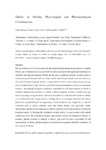Mostrar o rexistro simple do ítem
Ghrelin in obesity, physiological and pharmacological considerations
| dc.contributor.author | Álvarez-Castro, Paula | |
| dc.contributor.author | Pena, Lara | |
| dc.contributor.author | Cordido, Fernando | |
| dc.date.accessioned | 2023-04-21T07:17:49Z | |
| dc.date.available | 2023-04-21T07:17:49Z | |
| dc.date.issued | 2013-04 | |
| dc.identifier.citation | Álvarez-Castro P, Pena L, Cordido F. Ghrelin in obesity, physiological and pharmacological considerations. Mini Rev Med Chem. 2013 Apr;13(4):541-52. | es_ES |
| dc.identifier.issn | 1389-5575 | |
| dc.identifier.uri | http://hdl.handle.net/2183/32905 | |
| dc.description | Review | es_ES |
| dc.description.abstract | [Abstract] The aim of this review is to summarize the physiological and pharmacological aspects of ghrelin. Obesity can be defined as an excess of body fat and is associated with significant disturbances in metabolic and endocrine function. Obesity has become a worldwide epidemic. In obesity there is a decreased growth hormone (GH) secretion, and the altered somatotroph secretion in obesity is functional. Ghrelin is a peptide that has a unique structure with 28 amino-acids and an n-octanoyl ester at its third serine residue, which is essential for its potent stimulatory activity on somatotroph secretion. The pathophysiological mechanism responsible for GH hyposecretion in obesity is probably multifactorial, and there is probably a defect in ghrelin secretion. Ghrelin is the only known circulating orexigenic factor, and has been found to be reduced in obese humans. Ghrelin levels in blood decrease during periods of feeding. Due to its orexigenic and metabolic effects, ghrelin has a potential benefit in antagonizing protein breakdown and weight loss in catabolic conditions such as cancer cachexia, renal and cardiac disease, and age-related frailty. Theoretically ghrelin receptor antagonists could be employed as anti-obesity drugs, blocking the orexigenic signal. By blocking the constitutive receptor activity, inverse agonists of the ghrelin receptor may lower the set-point for hunger, and could be used for the treatment of obesity. In summary, ghrelin secretion is reduced in obesity, and could be partly responsible for GH hyposecretion in obesity, ghrelin antagonist or partial inverse agonists should be considered for the treatment of obesity. | es_ES |
| dc.language.iso | eng | es_ES |
| dc.publisher | Bentham | es_ES |
| dc.relation.uri | https://doi.org/10.2174/1389557511313040007 | es_ES |
| dc.subject | Obesity | es_ES |
| dc.subject | Ghrelin | es_ES |
| dc.subject | Appetite regulation | es_ES |
| dc.subject | Weight homeostasis | es_ES |
| dc.subject | Gastrointestinal hormones | es_ES |
| dc.title | Ghrelin in obesity, physiological and pharmacological considerations | es_ES |
| dc.type | info:eu-repo/semantics/article | es_ES |
| dc.rights.access | info:eu-repo/semantics/openAccess | es_ES |
| UDC.journalTitle | Mini Reviews in Medicinal Chemistry | es_ES |
| UDC.volume | 13 | es_ES |
| UDC.issue | 4 | es_ES |
| UDC.startPage | 541 | es_ES |
| UDC.endPage | 552 | es_ES |
Ficheiros no ítem
Este ítem aparece na(s) seguinte(s) colección(s)
-
GI-FENM - Artigos [109]






